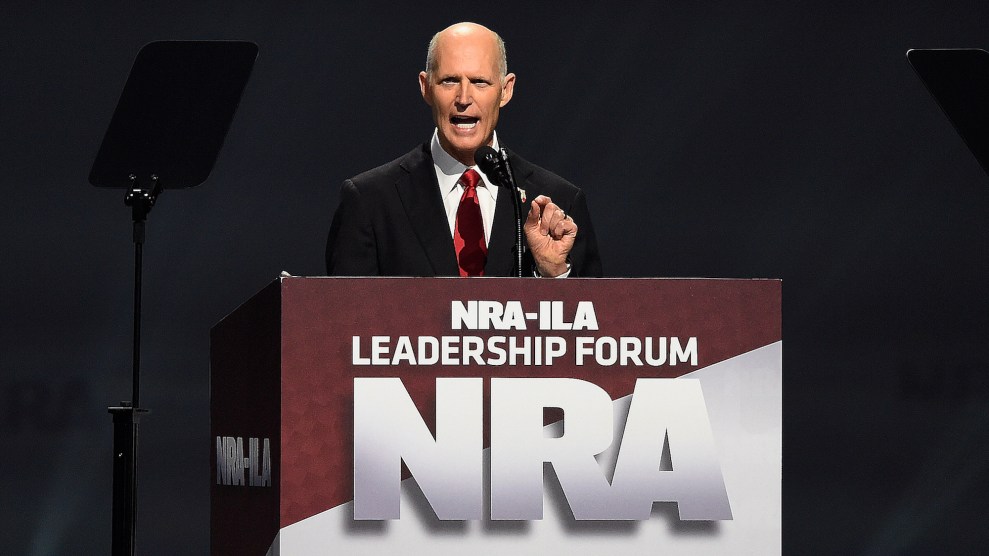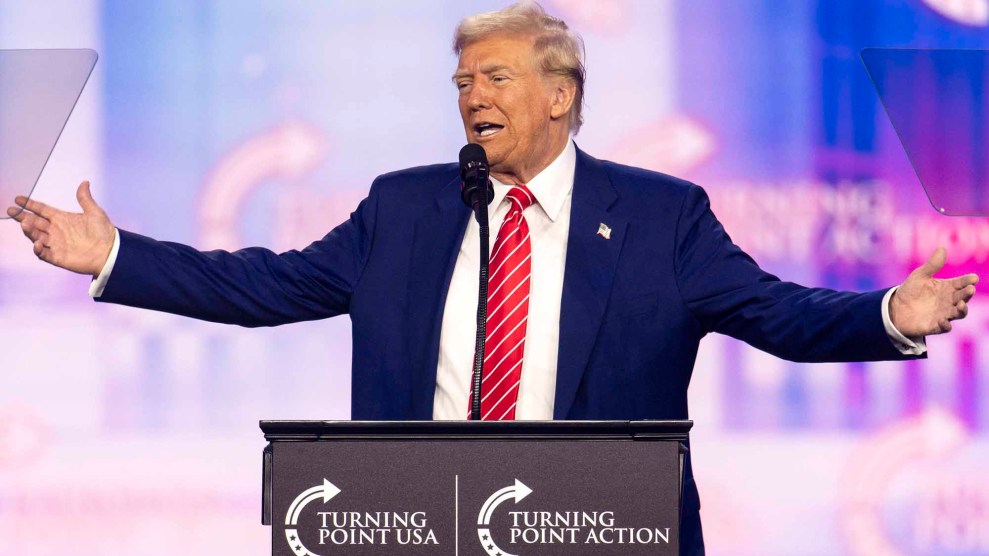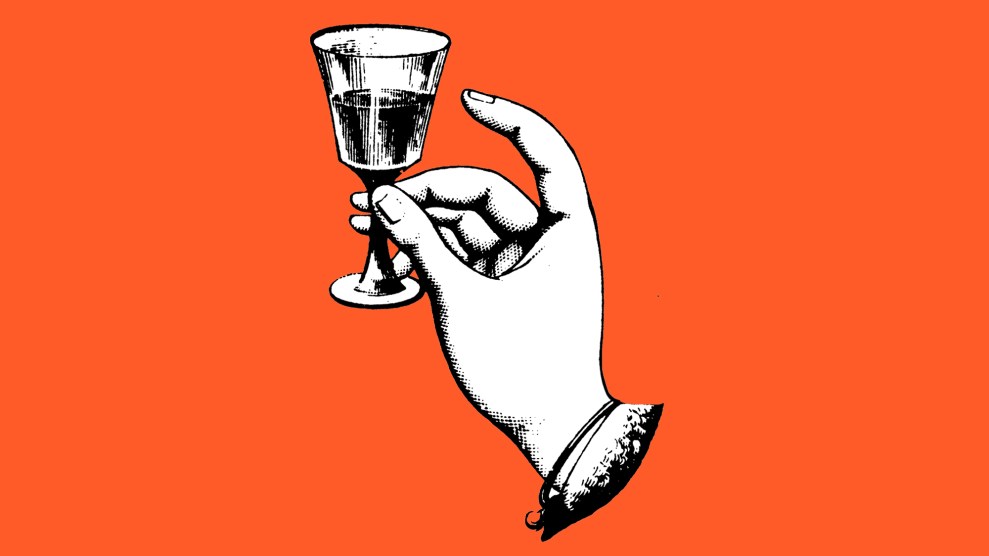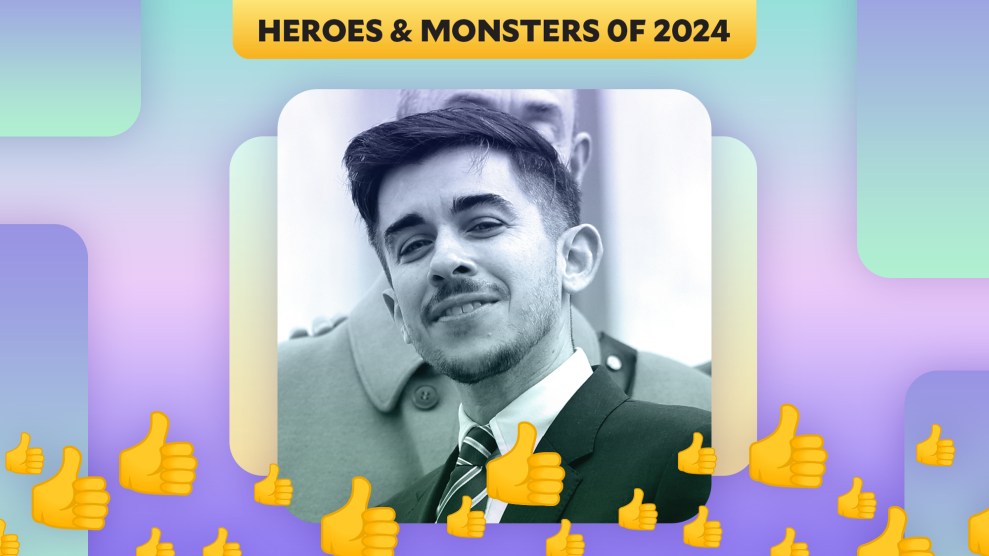
Florida Gov. Rick Scott speaks at the National Rifle Association's Leadership Forum in on April 28, 2017. Scott canceled his scheduled encore appearance at the 2018 Leadership Forum after the Parkland massacre.Mike Stewart/AP
Exactly seven months after the massacre at Marjory Stoneman Douglas High School, Fred Guttenberg stood behind a lectern in the conference center at the Coral Springs Marriott, the same hotel where he had learned his daughter Jaime had been among the 17 killed and where he had gathered with hundreds of mourners days later to remember her life. But on this September afternoon, Guttenberg, whose loss has turned him into a relentless gun control activist, had returned to the site for a press conference to announce his endorsement of Florida Democratic Sen. Bill Nelson in his tough reelection campaign against the state’s governor, Republican Rick Scott.
Sen. Nelson joined Guttenberg behind the lectern, as did Mitch Dworet, who lost his son Nick in the massacre, and Rep. Ted Deutch, the Democrat who represents Parkland in Congress and has become a friend and ally of Guttenberg since the February tragedy. Standing before a crowd of 30—which included some of the most recognizable faces of the student-led March For Our Lives movement and half a dozen Moms Demand Action members in their distinctive red shirts—Guttenberg thanked the three-term senator for his support of “common sense” gun safety legislation and his recent efforts to block 3-D printed guns, noting that he’d moved about those normally divisive subjects in a bipartisan way.
But Guttenberg didn’t have much to say about Nelson beyond that. He instead devoted his remaining time to eviscerating Gov. Scott, whose state he described as “one of the most gun friendly” in the nation because of the influence of the National Rifle Association. “Rick Scott has an A+ rating from the NRA, and they are working really hard to elect him,” Guttenberg warned the crowd. “Even though I appreciate what was done in Florida since February 14, you cannot walk away from your history, and unfortunately, Rick Scott’s relationship with the NRA is as strong as ever.”
On paper, that’s not exactly true. The gun rights group hasn’t dropped a dime into the Florida Senate race, nor has it endorsed Scott. This reticence stands in sharp contrast to the support the NRA has given to other Republicans challenging vulnerable Democratic senators like Nelson: Last month, the group endorsed the challengers to Democratic Sens. Joe Donnelly (Ind.), Joe Manchin (W.Va.), Claire McCaskill (Mo.), and Jon Tester (Mont.), who are all up for reelection in states that President Trump won two years ago. The dynamic has encouraged many of those Democratic senators to double down on their commitment to gun rights, even as the majority of their Democratic Senate colleagues take the opposite tack.
But that scenario hasn’t played out in Florida, a state that’s hosted two of the worst mass shootings in US history. The outrage that followed the Parkland massacre pushed Scott, whose gubernatorial tenure has earned Florida such unsavory monikers as “The Gunshine State” and the NRA’s “petri dish,” to sign into law a bipartisan package that defied the NRA’s wishes by including, among other measures, a raised minimum age for all gun purchases and a three-day waiting period for gun sales, an action that likely soured Scott’s esteem with the group.
In the aftermath of the deadliest school shooting since the 2012 massacre at Sandy Hook Elementary, the move generated goodwill among the majority of Floridians who support stricter gun laws—but not quite enough to erase memories of the many times Scott had sided with the gun lobby, especially among those who survived the 2016 attack on Pulse nightclub in Orlando, which was then the worst mass shooting in US history. In this tight race, those activists are rallying to Nelson’s defense—if only to ensure that Scott doesn’t win the message on guns.
Much of Scott’s tenure as governor stands as a perfect foil for the gun violence prevention movement. During his nearly eight years in office, Scott has signed bills that cut the cost of concealed weapons permits, prohibited doctors from asking patients about gun ownership, and punished local officials who tried to enact stricter gun laws than those in place at the state level. Scott also expanded the state’s “stand your ground” law—a self-defense law that provides immunity to people who respond to perceived physical threats with lethal force—to include additional provisions that err in favor of the shooter. Scott’s actions have been met with their attendant rewards from the NRA—at the time of the Parkland shooting, the governor enjoyed an “A+” rating from the gun rights organization and had spoken at its annual leadership conference in 2017.
But in the aftermath of the Stoneman Douglas shooting, Scott showed he could be swayed. He promised the grieving families that he would pull together a group of experts to determine what he could push through the state legislature and that he’d incorporate the families’ feedback into whatever he designed. Scott then asked Florida’s Speaker of the House and president of the Senate, both fellow Republicans, to draft legislation and find the votes. The legislature’s final product, The Marjory Stoneman Douglas Public Safety Act, walked a fine bipartisan line that mirrored Scott’s initial proposal to varying degrees. In addition to the gun restrictions, it put $400 million toward mental health services and school hardening resources like bulletproof glass and metal detectors, and it permitted the arming of teachers and other school staff.
Everytown for Gun Safety, the gun control organization with a stated purpose of countering the NRA’s influence, heralded Florida’s new laws as a “landmark” package passed “over the gun lobby’s objections.” Scott also quietly canceled his planned encore appearance at NRA’s 2018 conference in Dallas. Weeks later, when he announced his Senate bid, his campaign website stated no position on gun rights or control—it only recalled the legislative victory of the Marjory Stoneman Douglas Public Safety Act.
Scott’s fans lauded the bill as an example of his leadership. Critics chastised the politically savvy Scott for appealing to the center weeks before he announced his Senate bid. But no one could ignore the fact that he got it done. “From my perspective, the governor’s office was an absolutely vital partner in getting that legislation through,” says Steve Schale, a Florida Democratic strategist who helped the Parkland families usher the bill through the state legislature. “Even folks like Fred Guttenberg who are supporting Sen. Nelson—I don’t think there’s a single parent, even if they have issues with Scott, who wouldn’t give him credit for that.”
Indeed, Guttenberg underscored his gratitude for Scott’s work during his remarks at Nelson’s campaign event, but he told me he had lost faith in the governor when it came to light that Florida’s agricultural commissioner, Adam Putnam, had failed to review a year’s worth of concealed carry permit background checks because he couldn’t log into the FBI database. “I called Rick Scott, and he said he shared my concern and was waiting for the facts to come out, and that he was ready to take action,” Guttenberg recalls from when the news about Putnam broke. “And then he never did.”
The Pulse survivors and their allies are well acquainted with feeling let down by their governor. Tallahassee not only dismissed any action on firearms safety following the 2016 shooting, but state lawmakers also slashed mental health funding statewide, hitting Central Florida, home of the Pulse shooting, particularly hard. “It’s not that the legislature and Rick Scott did nothing after Pulse,” said Rep. Carlos Guillermo Smith, a Latino- and LBGTQ-identifying lawmaker who represents part of Orlando in the state legislature. “They made things worse for us.”
In fact, Scott’s quick action after the Parkland shooting, Smith discovered, wasn’t an open invitation to heal past wounds. Smith proposed 10 amendments to the bill Scott and his allies were shoving through the legislature, including a ban on assault weapons and a $1 million appropriation for a Pulse memorial—the bill had allocated an equal amount to commemorate the Parkland event. Each of them failed. When Smith was asked if he gave Gov. Scott and the Republicans credit for their swift response, he was incredulous. “I’m like, ‘Excuse me. I don’t think that they acted quickly. In case you forgot, just two years ago, 49 mostly LGBTQ people of color were murdered at Pulse nightclub, and nothing was done.'”
I asked Smith if he thought bigotry was a deciding factor. “There’s no question that Rick Scott likes to pick and choose which victims of gun violence he cares about,” he replied, “and which ones he doesn’t.” After being repeatedly invited to pin the rainbow grosgrain ribbon Floridians wear to commemorate the shooting to his jacket, Scott only did so at the two-year anniversary event this past June, two months into his Senate race.
The day after the event at the Coral Springs Marriott, Guttenberg and Nelson appeared together in Orlando alongside gun control advocates from the Pulse massacre. Each activist began their remarks by endorsing Nelson but soon began to condemn Scott. “I am not sorry for spending every last breath I have rejecting your sadistic brand of narcissism that is killing us,” said Pulse shooting survivor Brandon Wolf, as he counted the numbers of days that had passed between the Pulse massacre and the Stoneman Douglas tragedy. “Six hundred twelve days of inaction, 612 days of criminal negligence, 612 days of the same old Rick Scott that ended with 17 more people dead.”
“I’m sorry we were too gay for you to be a priority,” Wolf said about Scott at Nelson’s press conference. “I’m sorry we were too brown to be worth fighting for.”
None of this, of course, has anything to do with Sen. Nelson, who has represented Florida in the Senate since 2001. Like other Democrats since the 2012 Sandy Hook shooting, he’s supported expanding background checks, an assault weapons ban, and laws that would keep guns from those who pose a risk to themselves or others. And following the home-state tragedy that gave rise to national outcry, earlier this summer, at the behest of gun safety activists, Nelson authored legislation that would ban 3-D printed guns. But his nearly 30-year career in Congress hasn’t always sided with stricter gun measures. In the 1980s, then-Rep. Nelson voted in favor of easing restrictions of the 1968 Gun Control Act, which governs interstate commerce of firearms (though he returned a $1,000 check from the NRA as a demonstration against the group’s influence soon thereafter). During his first term in the Senate, he voted to protect gun manufacturers and trade organizations from being held liable should their products cause harm in criminal use. “Sen. Nelson’s evolution on the issue is representative of a lot of the change in the debate over the last decade,” Schale says.
Besides the endorsements from the Parkland and Pulse community, the national gun groups have been slow to show their support for Nelson, even as they were quick to do so for several of his Senate colleagues. The Brady Campaign is in conversations about a possible endorsement; Giffords and Everytown have not yet announced their plans. The focus for all three organizations this cycle, much like the national Democratic Party organs themselves, is on efforts to flip the House with less attention to the Senate. The groups have also not mobilized against Republicans who have been relatively independent of the NRA.
Even so, the groups’ frustrations with Scott are well-documented. Giffords, for example, ran a six-figure ad campaign that condemned Scott’s guns record in the wake of the Parkland tragedy and lashed out against his Senate candidacy when he announced his bid in April. (Sen. Chris Murphy (D-Conn.), the Senate’s most vocal gun control advocate, had intended to stump with Nelson and Guttenberg near Parkland last month, though Hurricane Florence kept him from attending.)
Meanwhile, Florida’s best-known gun safety activists, the Stoneman Douglas student survivors, are constrained in their ability to help Nelson win. The #NeverAgain teens have vowed to vote any lawmaker who stands with the NRA out of office, but that vow is nonpartisan, which means they won’t endorse Nelson, no matter how well-aligned his positions are with their mission. The March for Our Lives student leaders who attended Guttenberg’s endorsement event near Parkland explained they’d come to support Guttenberg, who has become close to the youth activists since the shooting. (Jaclyn Corin, one of the prominent March for Our Lives leaders, had danced with Guttenberg’s daughter Jaime.)
Matt Deitsch, the 20-year-old Stoneman Douglas alumnus who serves as the group’s chief strategist, put it this way: “We support policies, not people.” But that doesn’t mean his team won’t work to tip the scales in Nelson’s favor. “I’m not here to bash Rick Scott; I’m just telling you all the shitty things he’s done,” he told me after the Parkland event, when I asked how he’d characterize his group’s role in the race. “And I’m not here to tell you Bill Nelson’s a great guy, but I can tell you about some of the great things he’s done. I can criticize and praise the work of every and any politician, because none of these guys are perfect.” David Hogg, one of the student leaders, has repeatedly reminded his nearly 900,000 Twitter followers that Gov. Scott cut funding for mental health care and signed into law a bill that prevents doctors from speaking with their patients about guns.
Their major focus has been a massive get-out-the-vote effort, which is how most of the gun control groups have weighed in so far. “Our Lives Our Vote”—the joint initiative across Everytown, Giffords, and NextGen, the progressive youth-focused organization—has registered 11,000 new voters in Florida so far. “The last two governors’ races were decided by a point. The last two presidential races were decided by a point,” explains Schale. “You look at the public polling for this race over the last month, it’s been a one-point race. One point is 60,000 votes.”
Schale doesn’t believe the gun vote will be a deciding issue, but there are signs it will assume a place of prominence. During their first televised debate on Tuesday evening, Nelson and Scott hammered each other over their records. Nelson, like the gun safety activists who support him, reminded viewers of Scott’s record of siding with the NRA; Scott accused Nelson of not accomplishing anything on school safety. Guttenberg, who has vowed to do whatever he can to keep Nelson in office, attended the debate as Nelson’s guest.
“I hope, Governor, that you will look Fred Guttenberg in the face and tell him you’re not going to support those kinds of police that you have with the NRA,” Nelson said, turning to his companion. Scott offered sympathies for the Parkland families in response.















